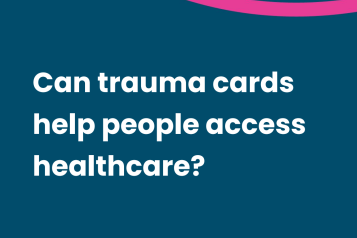Inquiry into discharge raises serious questions about maternal mental health support

Early findings from our special inquiry into the discharge process suggests that women who have just given birth are being so overwhelmed by a confusing array of pamphlets and advice about becoming a parent that they are not necessarily taking in important information about the warning signs of postnatal depression.
Those with pre-diagnosed mental health conditions are also struggling to get the help they need, often being sent home before they are ready, or in some cases being separated from their new baby in general hospital wards.
For example, every year there are around 8,000 pregnant women in England who suffer from bi-polar disorder*. To avoid complications, such as their unborn baby developing Spina Bifida, these women have to come off their medication making it difficult for them to manage their condition and risking potential crisis.
There are some excellent specialist mother and baby units designed to provide the extra care and support these mums need, but with just 17 in England providing a total of 122 beds** not all those who need this care can access it. As a result, some new mums in need of this care are being supported on standard acute wards or being discharged and slipping through the net, potentially putting both mums and their newborns at risk.
These concerns have been raised as part of Healthwatch England's first special inquiry into how the health and social care services manage the transfer of patients and care users from one part of the system to the next.
The special inquiry is looking in detail at how the discharge process is managed for particularly vulnerable groups such the homeless and the elderly, as well as those with mental health conditions.
The concerns uncovered around maternal mental health services reflect wider issues around support for those with mental health issues. Many people are being sent hundreds of miles away from their family and friends to receive the care they need or potentially being discharged without the proper support being in place.
Anna Bradley, Chair of Healthwatch England, said:
"The most common maternal mental health issue, post-natal depression, affects between 10 and 15 per cent of new mums and so it is absolutely vital that by the time they leave hospital all women understand the symptoms and know where they can find help should they need it.
"Likewise, more needs to be done around discharge planning for mums with existing mental health conditions to ensure they and their partners have the support they need in place well in advance of giving birth.
"Ultimately though, these problems are symptomatic of wider issues with mental health support and the discharge process."
Case studies
After experiencing a traumatic labour and an emergency caesarean Kathryn Grant became catatonic and psychotic which lasted for about 12 hours. But after a few days and treatment for an infection she was discharged from hospital, only to be rushed back to A&E within 48 hours after, in her own words, with the 'last shred of her sanity' begging her father to take back to hospital where she was fortunate to get a place in a local mother and baby unit.
Hannah Dunstan, who had been previously diagnosed with bipolar disorder, carefully planned her pregnancy. But when it came to leaving the hospital after giving birth, Hannah and her husband Tex felt the staff were too cautious, keeping mother and baby in the hospital for 17 days, putting everyone under needless stress because the maternity unit didn't have the right expertise to deal with her situation.
Hannah said:
"There was almost a prejudice and assumption that I couldn't look after my baby. First of all it was my sleeping, then it was my breast feeding, then it was because my blood pressure went up, which always happens when I'm kept inside for too long without fresh air."
Notes to Editors
* This is a conservative estimate based on Bipolar UK’s assessment that between 1 and 2 per cent of the adult population are bi-polar and the number of births per year according to the ONS.
** These figures were published in NHS England’s Standard Contract and Service Specification for Specialised Perinatal Mental Health Services (pg 15).
Bipolar - The Facts (sourced from Bipolar UK)
1% to 2% of the population experience a lifetime prevalence of bipolar and recent research suggests as many as 5% of us are on the bipolar spectrum.
Bipolar also has a huge impact on family and friends.
On average it takes 10.5 years to receive a correct diagnosis for bipolar in the UK and before bipolar is diagnosed there is a misdiagnosis an average of 3.5 times.
Compared to other health problems, treatment of bipolar is still badly affected by misunderstanding and stigma.
Bipolar affects every aspect of your life and your relationships. Family and friends can all be put under stress. This is why you need to get a correct diagnosis, accept treatment and start to learn how you can adapt your lifestyle to cope with the ups and downs.


